I am extracting prosody features from an audio file while using Opensmile using Windows version of Opensmile. It runs successful and an output csv is generated. But when I open csv, it shows some rows that are not readable. I used this command to extract prosody feature:
SMILEXtract -C \opensmile-3.0-win-x64\config\prosody\prosodyShs.conf -I audio_sample_01.wav -O prosody_sample1.csv
And the output of csv looks like this:
[
Even I tried to use the sample wave file given in Example audio folder given in opensmile directory and the output is same (not readable). Can someone help me in identifying where the problem is actually? and how can I fix it?